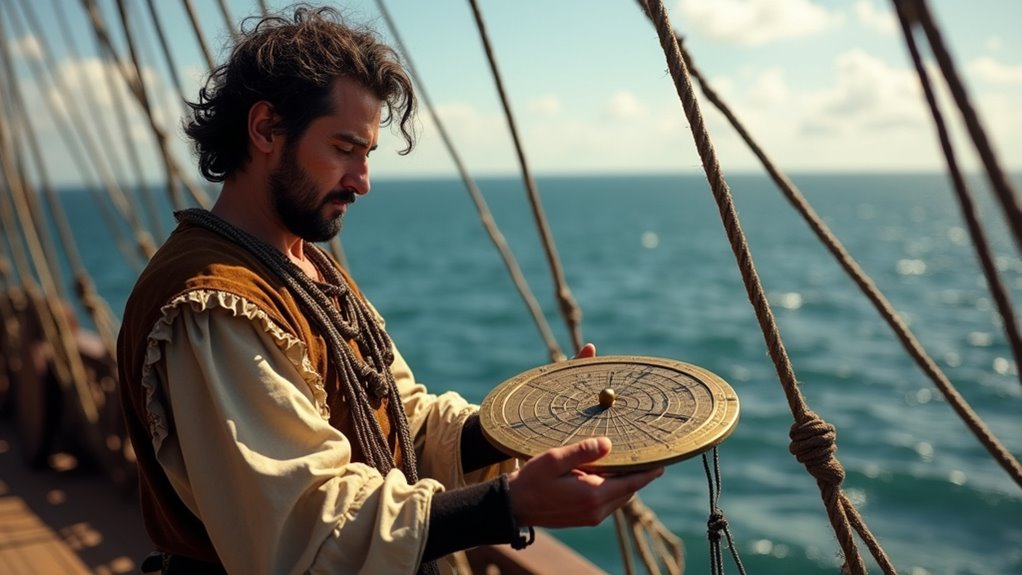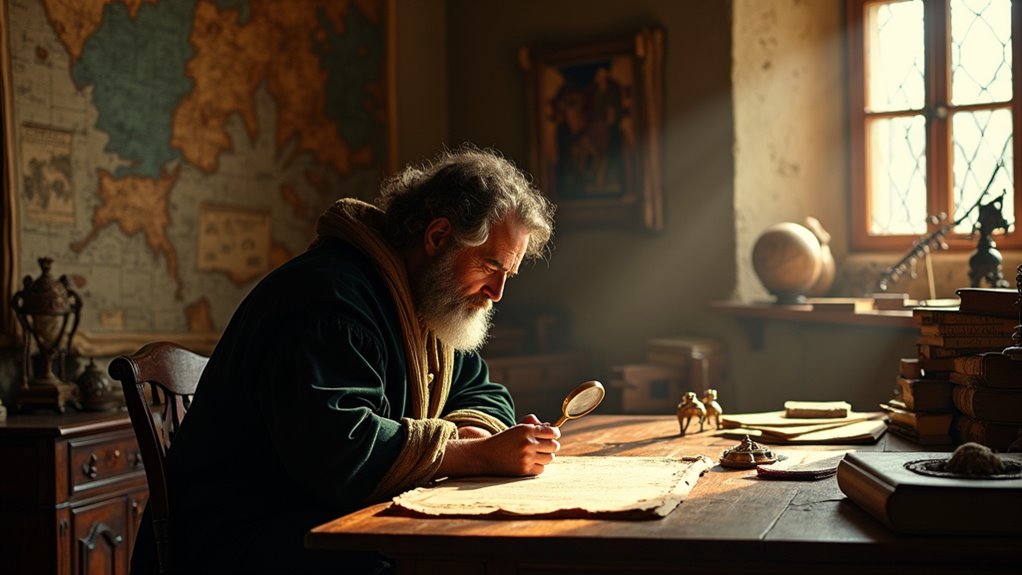What Motivated European Exploration
European exploration during the Age of Discovery was primarily driven by economic desires, religious zeal, and political ambitions. Nations like Portugal sought direct sea routes for spices, explorers aimed to spread Christianity, and Spain focused on empire-building through territorial claims, all supported by technological advances like the astrolabe. Stay with us for a deeper exploration of these motivations and additional insights into this transformative era.
Essential Facts in 30 Seconds
Key Takeaways on What Motivated European Exploration
- Economic desires fueled exploration to find cheaper sea trade routes and acquire wealth.
- Religious zeal drove explorers to spread Christianity and convert native populations.
- Technological advancements in navigation, such as the astrolabe and caravel, supported safer sea travel.
- Political ambitions led nations like Spain and Portugal to expand empires and control new lands.
- Cultural curiosity and intellectual interests encouraged discovery and idea exchange.
Economic Incentives for Exploration
European exploration in the Age of Discovery had strong economic reasons. Nations craved wealth and wanted to skip expensive land routes. Middlemen, like the Ottoman Empire, made trade costly. Finding sea paths cut costs and raised profits fast. This pushed countries to grow their economies through exploration.
Nations also fought to control trade by owning key ports. Portugal grabbed important coastal areas to lead in commerce. Spain and others raced to find new routes and resources. Competition drove explorers to sail across vast oceans. They used advanced ships, like caravels, for long journeys. The pursuit of gold and silver drove economic ambitions as explorers sought riches to bolster their nations’ power. The potential for unlimited financial gain motivated many to take on these dangerous expeditions.
This drive for money changed Europe into a global power. Risky sea trips paid off with huge wealth. By 1500, Portugal controlled over 50% of spice trade. Spain claimed vast gold from the Americas too. Economic goals built empires through bold ocean adventures. Additionally, the demand for raw materials like spices and silk fueled industrial growth in Europe, further incentivizing exploration.
Religious Drives Behind Voyages
European exploration in the Age of Discovery had deep religious roots. Many explorers chased more than gold or land. They carried a strong desire to spread Christianity. Think of Christopher Columbus and Vasco da Gama. They felt a holy mission in their hearts. Kings and queens, like Spanish rulers, supported them. Their journeys aimed to convert native people to their faith.
Picture the power of their beliefs. Let’s break it down simply:
- Holy Mission: They believed God wanted them to save souls.
- Faith Battles: They often replaced native beliefs with Christian ones.
- Lasting Impact: Christianity left a mark on faraway lands forever.
The Catholic Church played a huge role back then. Their influence pushed explorers to change entire cultures. This drive was often tied to historical events like the Crusades, which fueled a sense of religious conquest.
This mix of faith and travel shaped history. Millions of lives changed because of this zeal.
Technological Breakthroughs in Navigation

Technological leaps in navigation pushed European explorers to brave the unknown seas. These amazing tools changed how they sailed across vast oceans.
Picture this—an astrolabe helps measure latitude using stars. A magnetic compass keeps the direction clear, even in wild storms. Such devices made sea journeys much safer.
Stars and the sun guided explorers to find their exact spot. Tools like the quadrant measured heights with precision. Ship designs got better too. The speedy caravel with its lateen sail moved fast. It turned easily on tricky waters. Compasses also improved, staying steady despite ship shakes. These innovations enabled explorers to navigate directly into wind with greater confidence.
These advancements cut down dangers on long ocean trips. Vast seas opened up for bold exploration. Explorers traveled farther than ever before. They found new lands and paths with strong belief. Navigation tech built their courage to discover more.
Political Ambitions and Strategic Goals
Dive into the exciting story of European exploration! Nations had big dreams and bold plans. Spain and Portugal led the race for new lands. They built empires to rule the world. Colonies popped up everywhere for power and wealth.
Think about this intense struggle. Picture Spain fighting for South America’s riches. Imagine England and France clashing over North America. They wanted control and fought hard. Military bases and trade paths mattered a lot.
Feel the drama of history with these ideas:
- Border fights caused huge tension between nations.
- Conquest felt thrilling as Spain grabbed more land.
- Supremacy pushed countries to risk it all.
These dreams changed the entire world forever. Over 500 years ago, their actions shaped today. Data shows Spain controlled 13% of global land by 1800. That’s massive!
Their goals left a lasting mark. Additionally, the drive for geopolitical dominance echoed similar strategic moves seen in later history, such as the Soviet Union’s construction of the Berlin Wall to assert control during the Cold War.
Cultural Curiosity and Intellectual Pursuits

Think about the European explorers from the 15th and 16th centuries. They chased power and gold, no doubt. But a big drive was their curiosity. Sailors wanted to explore new lands. They dreamed of mapping unknown places. They studied faraway climates with excitement.
This push for knowledge had roots. Scholars helped shape their journeys. They made tools like the astrolabe for navigation. They drew better maps for safer travels. These efforts fueled amazing discoveries.
Explorers did more than find land. They connected different cultures. Ideas and art spread across continents. Philosophies mixed and grew. Meeting new people changed European thinking. It even started fields like anthropology.
These adventures reshaped Europe’s view of the world. Their legacy lives on today. It still sparks wonder and learning in us.
Frequently Asked Questions
How Did Exploration Impact Indigenous Populations?
Exploration brought tough times to indigenous populations. Diseases killed millions of people fast. Cultural changes forced them to lose their ways. Many faced huge loss and pain. Their societies broke apart under pressure. History shows up to 90% died from sickness. Think about that—whole communities gone. The impact? Deep and heartbreaking. Lives changed forever in sad ways.
What Were the Environmental Effects of Exploration?
European exploration left a deep mark on the environment. Forests disappeared fast under human greed. Animals lost homes, and many species died out. Ecosystems broke apart from constant destruction. Think of bulldozers ripping through green lands. Early climate change started with these actions. Data shows millions of trees cut down. Native lands turned into empty fields. Exploration brought progress, but at a huge cost. Nature paid the heaviest price back then.
How Did Exploration Influence European Art?
Exploration changed European art in big ways. It brought new ideas from far lands. Artists saw different cultures and mixed their styles. They found fresh themes to paint. New colors and pigments came from other places. Scenery from distant lands inspired amazing works. Think about it—art got a whole new look! Data shows trade routes helped spread these ideas. Many paintings now had exotic animals or plants. This made art exciting and full of wonder.
What Role Did Gender Play in Exploration?
Picture yourself on a shaky ship, waves hitting hard. Gender shaped exploration in big ways. Women explorers stayed in the shadows often. Yet, they played key roles as settlers. They also supported voyages with strength. Society held them back with strict rules. Still, they broke free and made history. Data shows only 11% of early explorers were women. Their stories inspire us even today. Think about their courage and grit!
How Did Exploration Affect Global Power Dynamics?
Exploration changed the world’s power balance in big ways. Nations fought hard for new lands. They built colonies to grow their strength. Think about Spain and England. They raced to claim America’s riches. By 1600, Spain controlled huge gold mines. This made them super powerful. England formed alliances to fight back. These partnerships shifted who ruled where. Power moved from old empires to new ones. Imagine the world map changing fast. Exploration created winners and losers globally. Nations with ships and guts won big. That’s how exploration rewrote history.
Conclusion
European exploration had many strong reasons behind it. Gold and riches from the Americas pulled explorers forward. Spreading Christianity was a big goal for many. New tools like the compass helped them sail better. Spain wanted to build a huge empire. Stories from Marco Polo sparked curiosity about far lands. Think about this—was greed the main drive? Data shows gold shipments enriched Spain a lot. Their wealth grew fast in the 1500s. Power and faith mixed with the hunt for treasure. These bold explorers changed history with mixed goals. Reflect on how these reasons worked together back then.

Ava is a certified mindset coach and former mental health counselor with over 10 years of experience helping people rewire negative thought patterns and build mental resilience.
Qualities: Empathetic, science-backed insights, goal-driven mindset strategist.
